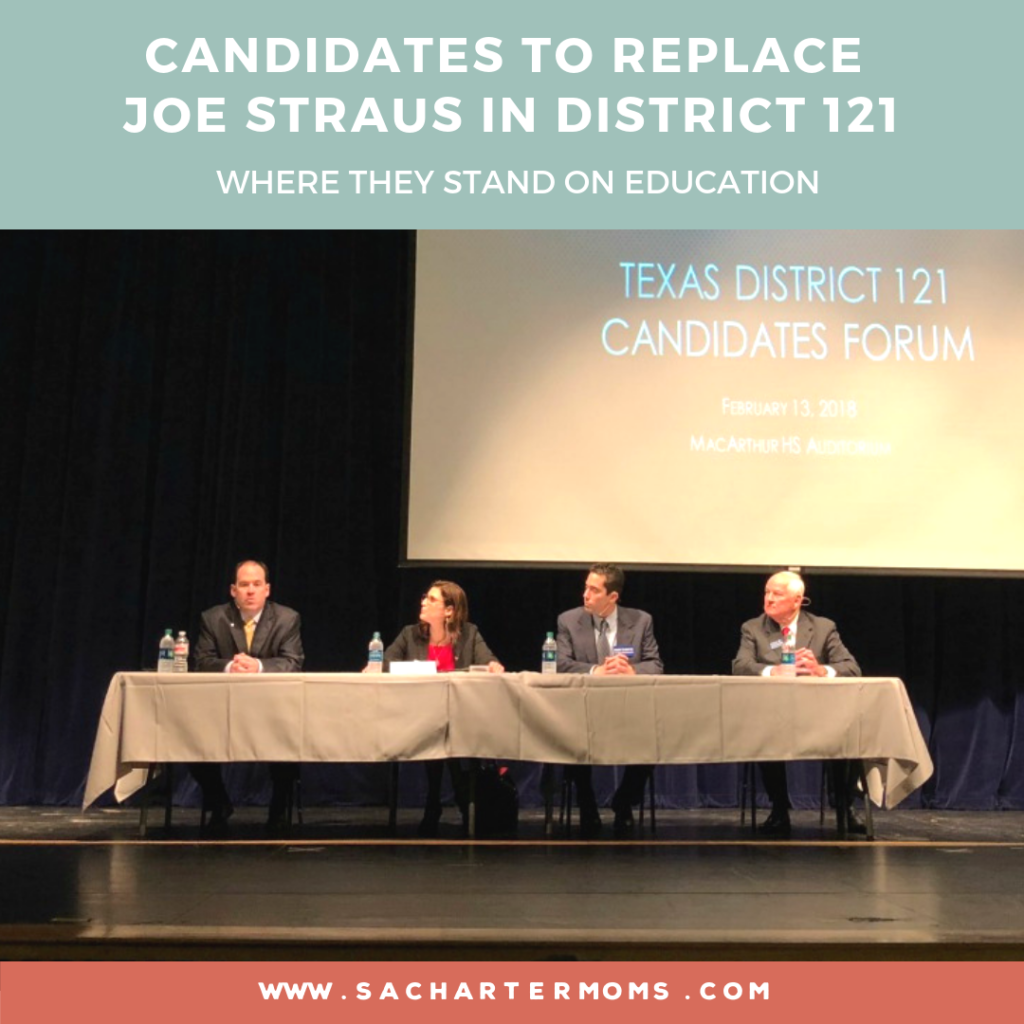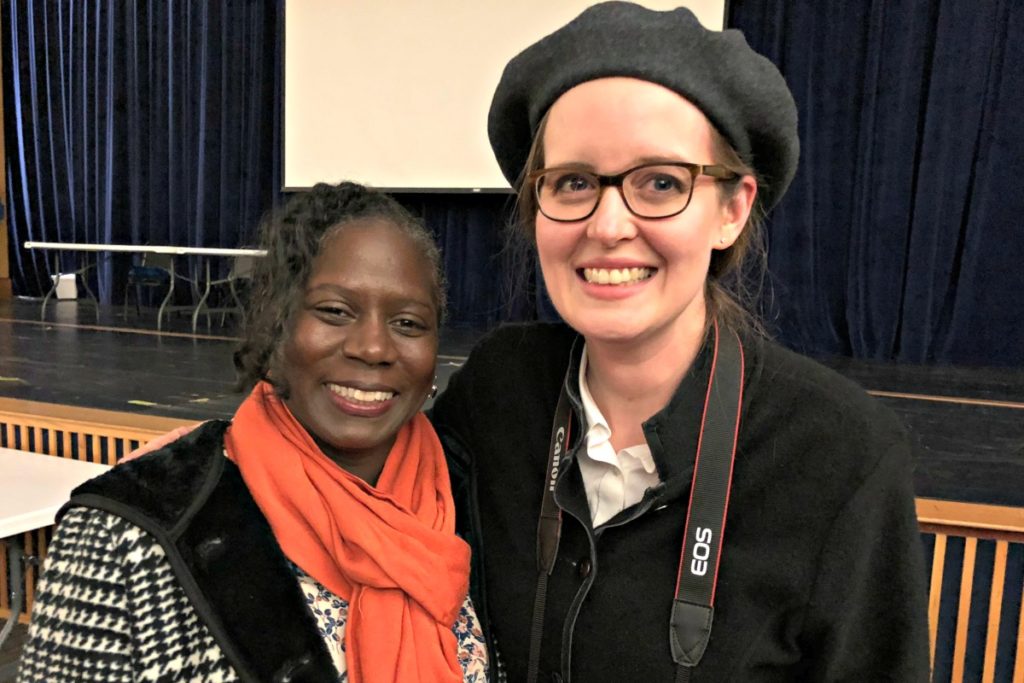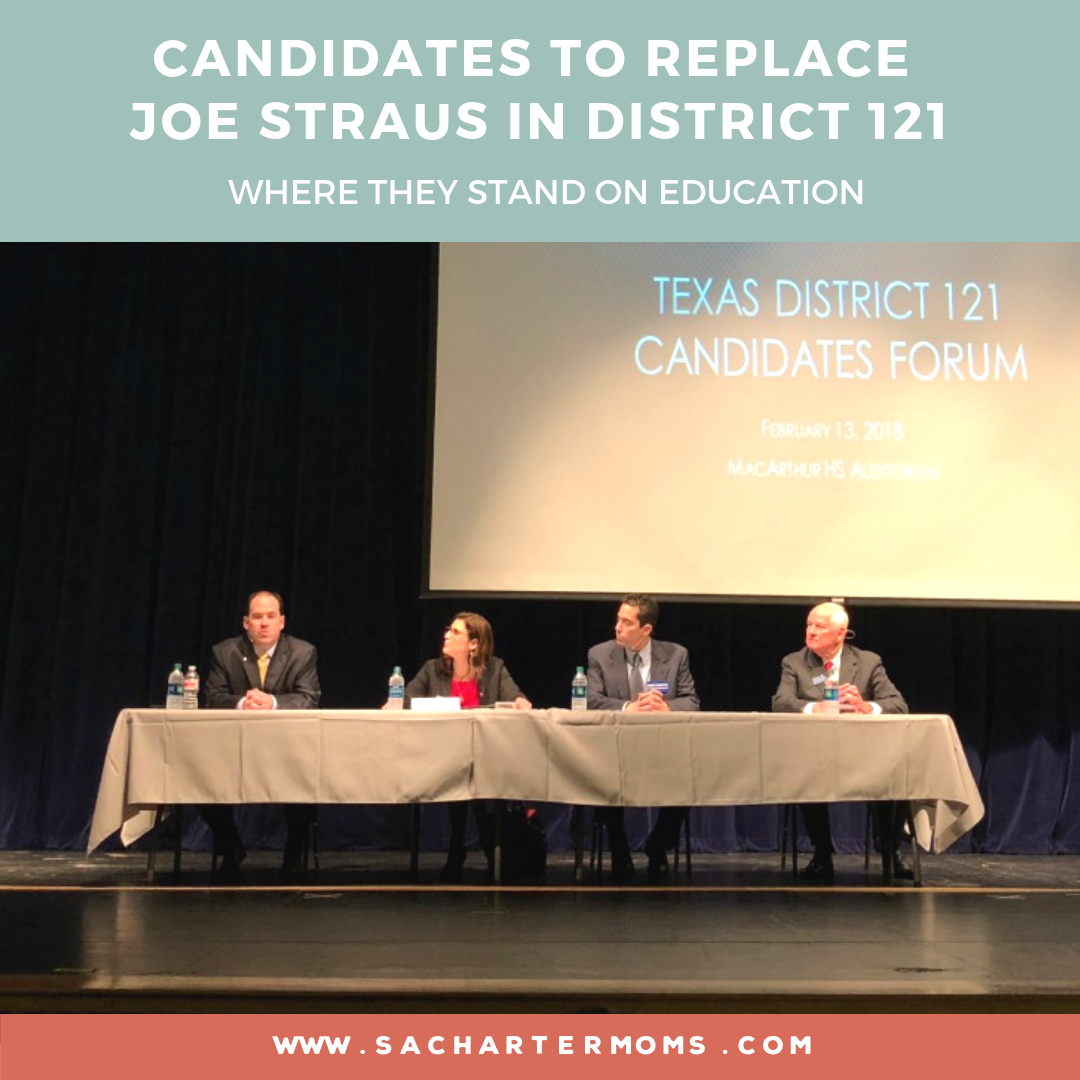
Seven candidates are competing in the March 6, 2018 primary election for Texas House District 121, the seat held by Joe Straus, Speaker of the House, who decided not to seek reelection. San Antonio Charter Moms readers want to know where these candidates stand on education issues, especially regarding school choice, charter schools, and school finance. I have done my research by attending candidate forums, sending questions by email, conducting phone interviews, and meeting with the candidates. I do not make endorsements, but I will present the information I’ve gathered and leave it up to my readers to draw their own conclusions.
In the Republican primary, the candidates (in ballot order) are Charlotte Williamson, Adrian Spears, Matt Beebe, Marc Whyte, Steve Allison, and Carlton Soules. In the Democratic primary, Celina Montoya is unopposed. Several candidates appeared at a February 13 forum at MacArthur High School hosted by MOVE San Antonio, the League of Women Voters of the San Antonio Area, and the North East ISD Council of PTAs. Among the questions asked at the forum, three were focused on education: If you have kids or grandkids, where do they go to school? What is your solution for school finance? And, where do you stand on school choice, charter schools, and vouchers?
Charlotte Williamson
Williamson appeared at the candidate forum, but the format did not serve her well: candidates had a limited time to answer, and sometimes she seemed to search for her words and hit her stride just as the timekeeper was signaling the end. Williamson has a sharp mind and a heart for service, but may need more experience before she is ready to lead a group as diverse as the constituents of District 121.
Williamson does not have children yet. Regarding school finance, she praised efficiency, criticized recapture (commonly known as “Robin Hood”), and called for studying different sources of revenue. On the topic of school choice, she noted that families are choosing where to live based on the schools, adding “if a family lives in an area with failing schools, they should get vouchers to go somewhere else.”
Adrian Spears
Spears was too ill to attend the candidate forum, but answered questions by email. He plans to enroll his children in North East ISD schools when they are older.
By email, Spears shared detailed plans for reforming school finance. Specifically, he wrote, “There is not enough focus on the teachers and the curriculum. School districts are borrowing excessive amounts of money and accumulating too much debt and focusing on administration and facilities.” His solution involves changes to how bond elections are run and improving transparency for voters.
Noting that the Texas Supreme Court has called for reforms to school finance, Spears says he “favor[s] a system that would eliminate Robin Hood, lower school property taxes and equalize spending on students across the state.” He proposed using state funds for operations, creating equality across districts, while keeping debt service local to strengthen transparency and accountability.
Regarding school choice, Spears wrote, “Public education policy should be student-centered and thus tax dollars should follow the student to their school of choice.”
Matt Beebe
Beebe is a conservative activist who challenged Straus in previous elections. At the forum, he gave clear answers that tended to break away from the pack. Beebe and his wife have two children who were homeschooled when they were younger, and now attend a private school. (As discussed in this earlier post about the District 116 race, many elected officials—even the ones who claim to support traditional public schools—send their own children to private schools.)
Regarding school finance, Beebe is more concerned about efficiency and the overall cost of public education than whether the money came from the state or from local property taxes. Beebe expressed concern about rising administrative expenses.
On the topic of school choice, Beebe praised Education Savings Accounts (ESAs) for students with special needs, referring to a provision that failed in the 2017 session. Beebe said, “It’s heartless to tell the mother of a special needs child, when the public school is failing them, that they can’t go get the help they need.” He acknowledged that “the vast majority of students will be educated in public schools, and we need to provide them with the best opportunity to learn.”
Marc Whyte
Whyte appeared at the forum and outshone the other candidates on stage with his good preparation and clear presentation. Later, Whyte met with me for an interview. He has two young daughters who attend private schools.
Regarding school finance, Whyte emphasized, “The state needs to properly fund public education.” He explained how, over the past ten years, the state’s share of the cost of public education has fallen from 49 percent to 38 percent. The difference is paid for by local property taxes. Whyte’s solution involves cutting other areas of state spending. He also proposes cutting waste in public education, such as excessive administrative costs, noting that “less than half of public school jobs are for teachers.”
“School choice will be part of the future of education in Texas,” Whyte said at the forum. He added: “I have seen very effective charter school programs.” In our interview, Whyte elaborated: “Competition raises standards for everyone. There is already evidence that traditional public schools have improved because of competition.”
At the forum, Whyte praised parents as decision makers: “I’m not going to tell a mom that they can’t move their child from a failing school.” He also noted that special education children have different needs, and parents need diverse school options to choose from.
Although he has not held elected office before, at the forum, Whyte acted like a political veteran. He expressed a commitment to stay in the legislature for multiple terms and seek a leadership position to look out for the interests of San Antonio.

Steve Allison
Allison appeared at the candidate forum and also spoke with me on the phone to clarify his remarks. He is a veteran community leader, having served on the boards of Alamo Heights ISD and VIA Metropolitan Transit, who is in the coda of his political career. His grown children are graduates of Alamo Heights High School. His school-age grandchildren attend private schools; the youngest ones may attend public school in Alamo Heights when they are older.
On school finance, Allison expressed concern that the share of funding from the state has been shrinking, while the share of funding from local property taxes has been growing. “If we need to readjust the budget to put more money in education, so be it,” said Allison. He does not believe that school districts have excess administrative costs.
Allison spoke about school choice at the forum:
- “I am a staunch advocate of public education.”
- “I am opposed to vouchers.”
- “I am opposed to the current system of charter schools. They are not on an equal footing when it comes to standardized testing or open enrollment.”
- “When charter schools operate like magnet schools to serve a specialized need, that is all right.”
I contacted Allison by phone to get confirmation of his positions about school choice. He was gracious about explaining his views, and repeatedly expressed hope for finding common ground. “We need to bring charter and [traditional] public school people together to mesh their concerns,” he said on the phone.
Allison told me that his friends who support traditional public schools tell him that charter schools are not subject to the same accountability as traditional public schools, but he did not offer details. He listened patiently while I explained that charter schools administer standardized tests like all other public schools, and that charter schools with low scores have fewer years to turn things around than traditional public schools with low scores.
He also hears complaints that “open enrollment is not being followed.” He added that there is a “cherry picking type mentality,” and the charter schools are “just taking the high-achieving kids.” This is a common myth about charter schools, but the reality is that charter schools, as a general rule, must accept any student who applies.
Allison is a mediator by profession, and he acknowledges that “there is a communication breakdown between charter schools and [traditional] public schools.” However, with such strongly held, but false, views about charter schools and public education, Allison presents a risk to the progress that charter schools have made in increasing high quality education options in San Antonio.
Carlton Soules
Soules could not attend the candidate forum, but spoke at length in a phone interview. He is a former San Antonio City Council member for District 10, which substantially overlaps with Texas House District 121. On council, he had a reputation as a contrarian who did his research and embraced detail and complexity. He is a graduate of public schools; his grown children attended public schools and private schools when they were younger.
Soules explained to me, “School reform is an extremely complex issue. There is no one-size-fits-all right answer.” He added, “There are ISDs that are failing. Charter schools are part of the solution. There may need to be vouchers. Also, we need to be holding ISDs accountable.”
Regarding school finance, Soules commented, “Throwing more money at the problem is not a solution.” He worries that if the state increased funding for public education, that the school districts would keep their tax rates the same and the overall burden on taxpayers would increase.
Soules had specific ideas for finding efficiency in education, such as combining procurement systems, and examining the process that leads to “Taj Mahal” construction projects on school campuses. He believes in strengthening accountability, referring to recent TEA-appointed conservators and boards of managers.
Soules supports more choices for parents: “We need to give better solutions to parents, and more solutions for parents.” He sees charter schools as beneficial in cities, especially in parts of town where the school boards have a history of disfunction, and for children with special needs.
In low-performing school districts, “People in those areas are trapped. We need to allow kids a way to get out of that trap.” For children with learning issues, sometimes it seems like there is nowhere for them to go. “We need the right schools for special education. I would support a voucher for that. There are special education students with no resources for private school who could benefit from it.”
Celina Montoya
Celina Montoya was unable to attend the forum because of a prior commitment as President of the Junior League of San Antonio, but she responded to questions by email. Her youngest goes to preschool and will soon join his older sister at public schools in Alamo Heights.
Montoya noted that the Texas Supreme Court has ruled on the constitutionality of the school finance system six times in the past 34 years, and four times has found it unconstitutional. The most recent decision called our current school funding model “awful but constitutional,” recognizing that it “meets minimum standards.” However, Montoya wrote, “I don’t expect my children to simply ‘meet minimum standards’ and we should expect more from our legislature. We must start by making the funding of our schools a legislative priority.”
She expressed concern that the legislature has been relying on the rise in property values that has increased the local share of education funding. Instead, the state should be proactive about funding necessary improvements, such as attracting, developing, and retaining qualified teachers; equipping all schools with the necessary tools and technology to provide appropriate instruction; and replacing high-stakes testing with appropriate assessment models that address individual student needs and opportunities for instructional growth.
Regarding school choice, Montoya would like to refocus the discussion away from vouchers and tax credits that fund private education. She wrote, “The true meaning of school choice looks at community-based efforts to support teachers, meet students’ needs, and engage parents in the process of educating our children. . . . It’s possible to meet state standards and engage our communities and our parents to provide equitable and non-stigmatizing accountability efforts that will lead our struggling schools to improve while holding accountable those schools which are unable to meet state standards.”
Celina describes herself as a product of public schools, and a contributor to many nonprofit and educational efforts. Celina says her experience in a family-owned business has helped her learn to work with stakeholders to identify practical and strategic approaches to seemingly intractable problems. She is unopposed in the Democratic primary.
Vote in the Primary
The Bexar County Elections site has more information about voting in the primary, including a form to find your precinct and a sample ballot tailored to your location. Early voting begins on Tuesday, February 20 and ends on Friday, March 2. Early voting is especially convenient because you can vote at any location, not just the polling place for in your precinct—where you will need to go on election day, Tuesday, March 6. Find more ways to be an engaged charter school parent in this earlier post.
To research more candidates before your cast your ballot, also see the Voters Guide from the League of Women Voters of the San Antonio Area, and endorsements from the editorial board of the San Antonio Express-News. Parent organizations can share information for advocacy; the North East ISD Council of PTAs is an example of that. Shari Doss, a former leader at the North East ISD Council of PTAs, is now President Elect of Texas PTA; we met recently at the Community Conversation on the Long-Range Plan for Texas Public Education, and re-connected at the candidate forum.

Have questions, or want to continue the discussion? Comment below, or join the San Antonio Charter Moms discussion group on Facebook.
Read more:
San Antonio Charter Moms: Charter Schools in San Antonio: Tips for Being a Politically-Engaged Parent
- “Candidates for Joe Straus’ District 121 Seat Talk Education, Transit, Guns,” Edmond Ortiz, Rivard Report, February 15, 2018
- “Candidate Forum House District 121,” MOVE San Antonio, Facebook Live video, February 14, 2018
- “Two attorneys take fundraising lead in GOP race to replace Straus,” Jasper Scherer, San Antonio Express-News, February 7, 2018
- “Six GOP candidates vying for Joe Straus’ open seat in primary,” Jasper Scherer, San Antonio Express-News, January 10, 2018
